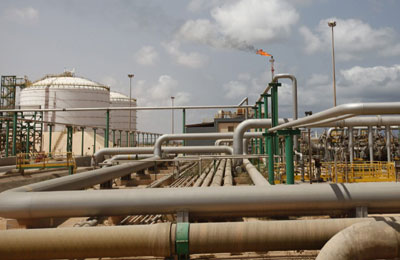
Libya eyes growth despite shaky security
Tripoli, April 17, 2013
Libya's economy minister expects growth of 3 percent this year, driven by a resurgence in oil production achieved despite security so precarious that government departments like his must be protected by pickup trucks bristling with weapons.
The Opec member restored pre-war oil output levels of around 1.6 million barrels per day (bpd) faster than expected after the 2011 armed uprising that ousted Muammar Gaddafi brought flows to a virtual standstill. The revival of oil production allowed Libya to record economic growth of over 100 percent last year.
"We expect growth of three percent this year, mainly driven by oil," Economy Minister Mustafa Abofanas told Reuters in an interview on Tuesday.
"This year is different from 2012. Libya is currently producing 1.5 million bpd. There are other sectors such as industry and agriculture which sustained damage during the fighting and we hope they can resume properly again soon."
His forecast is more conservative than others. Last year, the International Monetary Fund said Libya's economy was poised to grow 17 percent in 2013 and should average growth of 7 percent annually between 2014 and 2017.
Libya's top oil officials have said they hope to increase output to 1.7 million bpd this year, however they have warned of the risk that protests and strikes could interrupt production.
A wave of disruptions, sometimes violent, targeting Libya's pivotal energy sector in the last year meant output was briefly cut several times.
Libya relies on petrodollars from hydrocarbon exports for 95 percent of its income. Analysts say it needs to develop the private sector, seeing potential for fisheries and tourism eventually, if the government can improve security.
Life has mainly returned to normal with new shops, cafes and restaurants opening regularly in the capital Tripoli, but the vast North African state remains awash with weapons.
Some 18 months after Gaddafi's death, transitional rulers are struggling to impose their authority on a myriad of armed groups who often take the law into their own hands - and sometimes storm government buildings.
Speaking at his office on the outskirts of Tripoli - itself secured by several pickup trucks mounted with anti-aircraft guns, Abofanas said he was looking at ways to boost the private sector and help diversify the economy.
"The ministry is looking at privatisation plans for certain industries; there are projects being studied for small and medium enterprises," he said. "We are discussing mechanisms for funds to finance this. We hope to have something by end-April."
In order to reduce Libya's reliance on volatile oil revenues, Abofonas said his ministry was also looking at boosting exports.
"There are many producers who are interested in exporting dates, olives and olive oil. We are also looking at developing tourism. But it is difficult to give a percentage of how much this will represent in terms of Libyan income in the future as we still need to do our research and this takes time."
"NOT NORMAL SITUATION"
Last month, the national assembly adopted a 2013 budget worth 66.9 billion dinars ($52.2 billion) - paid for by oil revenues - in which the authorities plan to scrap food subsidies and instead hand out cash to families.
Some 20 billion dinars have been dedicated to infrastructure and reconstruction projects; state salaries account for 31 percent - more than before - as the state payroll now includes tens of thousands of former rebel fighters from the war.
"We are not in a normal situation right now. A lot is going towards state salaries, compensation, trying to rebuild what was damaged," Abofanas said.
Inflation is around 6 percent, similar to last year's levels while unemployment is estimated to be around 15 percent.
"The government is looking at what steps to take to lower (inflation) but things will be clearer next year. It is difficult to give a (target) figure right now," he said.
Part of an interim administration that will lead the nation towards a new constitution, Abofonas has a short term plan to review laws implemented by the previous regime and help rebuild the country after the conflict.
One sector likely to face change is Libya's banking sector, with the government now working on regulating the industry.
"The government is looking at modernising this sector," Abofonas said. "It is looking at Islamic banking as well as Islamic insurance. There are conferences scheduled on that."
Other plans include economic decentralisation, especially called for in the eastern city of Benghazi, cradle of the Libyan revolt. There, residents say they want the country's new constitution to give the city powers to manage its own affairs and a share of the eastern region's resources.
Abofonas said he had travelled to Benghazi last week where he discussed creating a free trade zone with local officials. "There are similar plans for other cities." - Reuters







